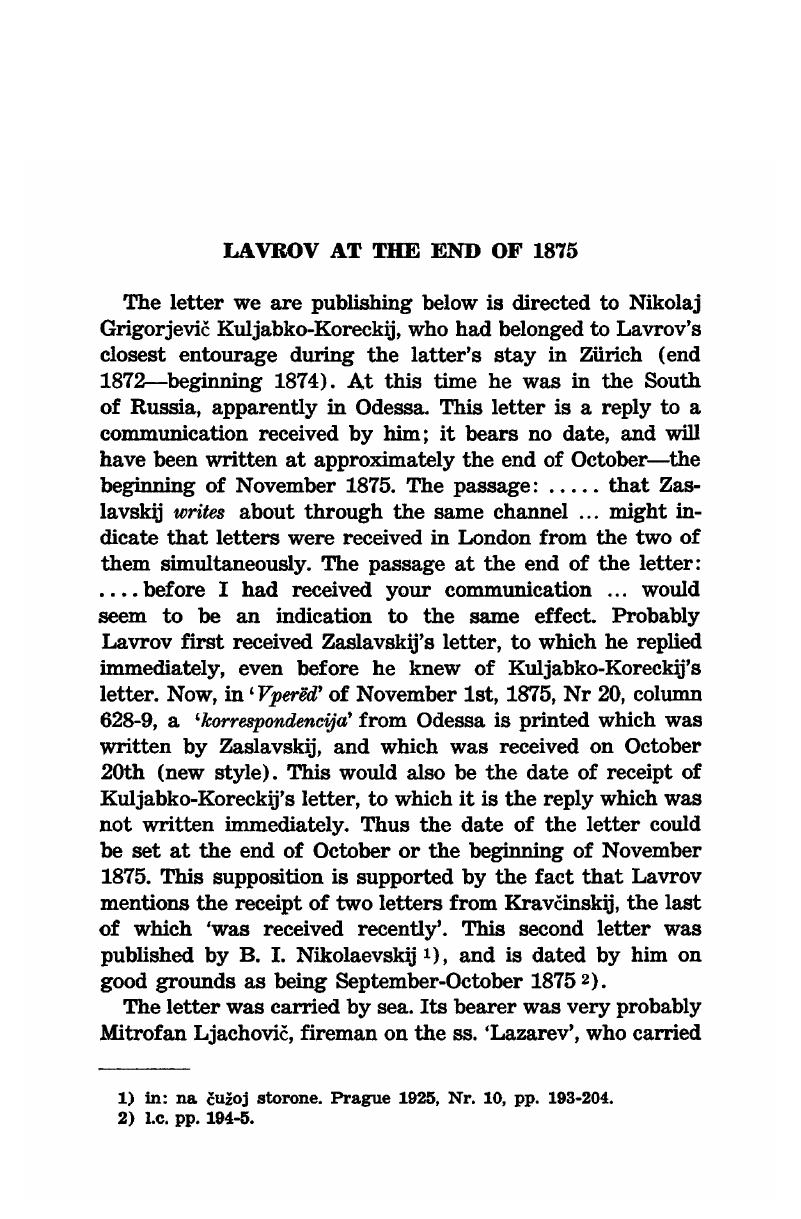No CrossRef data available.
Published online by Cambridge University Press: 18 December 2008

1) in: na čužoj storone. Prague 1925, Nr. 10, pp. 193–204.
2) l.c. pp. 194–5.
3) Rabočee, dvîenie v Rossii v XIX veke, Gospolitizdat 1950-1951, II, 2, p. 139.Google Scholar
4) ibid. p. 131.Google Scholar
5) From two letters from V.N. Smirnov to R. Ch. Idel'son of 31st Oct. and 1st Nov. respectively, of which the Institute possesses copies (the letters themselves have been lost), it appears that the above supposition is indeed correct. In the first letter we read, ‚Just imagine, yesterday, when I was about to go to the post the young bear comes along and says, „Do you know, I had forgotten to give you another letter which the worker gave me, together with the other letter from Nadja; it must be from a kružok, for it is signed like that” I take the letter, and what do I see? A communication from N…j. I say to him (the bear): „Good Gracious, you had forgotten to give me the most important thing. For this means that N knows Z. And in fact, as the worker had said, a young man had come to him with Z. who completely answered to the description of N. And from the second letter: From noon up to now, i.e. half past three I have practically unintermittently been coding the letter to N…j. Today the worker is to call for It. It Is a letter, and no mistake! I had asked the old man to write it, and he has done his best! Four closely written pages!’…
6) Valerijan Nikolaeviě Smirnov, 1849–1900, came to Zurich in 1871, and there and In London worked together with Lavrov as secretary of the editorial staff of Vperëd. After Lavrov's resignation he edited the last-published fifth volume of Vperëd.
7) v. e.g. Itenberg, B., Dejatel'nost' „Južnorusskogo sojuza rabocičh”, Voprosy Istorli, 1951.1.86–99.Google Scholar
8) Well known in this connection is the activity in Rostov on the Don and Odessa. As appears from an unpublished communication from Zaslavskij the third town is Kišinëv.
9) Vperëd, I, Zürich 1873 p. 1–27. v. in particular p. 11.Google Scholar
10) One of the first and most important circles, from which in 1872–1874 the ‘movement to the people’ originated; it was named after one of its leaders, N.V. čajkovskij.
11) This was the name of the movement supported by those who preached the necessity of rebelion (bunt), in opposition to Lavrov's ‘propaganda’.
12) Byloe, No. 14, Paris 1912; na čužoj storone (v.n. 1).
13) Dmitrij Kiemene (also: Klemens), very active in the revolutionary movement of the seventies, member of the Cajkovsky, emigrated in 1874, author of the well-known satyrical poem on Lavrov: Eks-professor, eks-professor… etc.; born 1848, died 1914.
14) A. I. Ivaňcin-Pisarev, also very active in the seventies, friend of Kravčinskij.
15) Materialy dlja istoril russkogo social'no-revoljucionnogo dviženjja, vyp. X: Lavrov, P. L., Narodniki-propagandisty 1873–1878 gg. p. 259,Google Scholar quoted by Nikolaevskij, , l.c. p. 195.Google Scholar
16) Sergej Michajlovič Kravčinskij-Stepnjak (1850–1895), member of the čajkovskij circle, went to the people as one of the first, emigrated In 1874, in 1875 took part in the movement in Herzegowlna together with M. P. Sažin-Ross, shortly after made the acquaintance of Bakunin. Back in Russia in 1878 he killed Mezencev, chief of the gendarmerie, and escaped abroad, where he published extensively on the revolutionary movement, amongst other things, ‘Underground Russia’.
17) I.c. 199 Michail Petrovic Sazin (Armand Ross), 1845–1926, in the revolutionary movement since 1863, emigrated in 1869; took part in the Paris Commune, was in close contact with Bakunin in the early seventies. Condemned to hard labour in 1878.
18) German Aleksaridrovič Lopatin, 1845–1918, in the revolutionary movement since the sixties; in 1870 helped Lavrov escape abroad; although very active he did not join any movement in the seventies; clandestinely went to Russia several times, was arrested several times. In Russia in 1884 as a member of the Narodnaja Voija he was arrested again, and was a prisoner in Schlüsselburg till 1905.
19) v. e.g. Bogučarskij, aktivnoe narodničestvo v 70-ch godach, M. 1912, chapter VIII.
20) Byloe, Nr. 14, p. 54.Google Scholar
21) Vperëd, 31 12 1876, Nr. 48, column 777.CrossRefGoogle Scholar
22) Article: Znanie i revoijucija, Vperëd (non-periodical) I. and III.